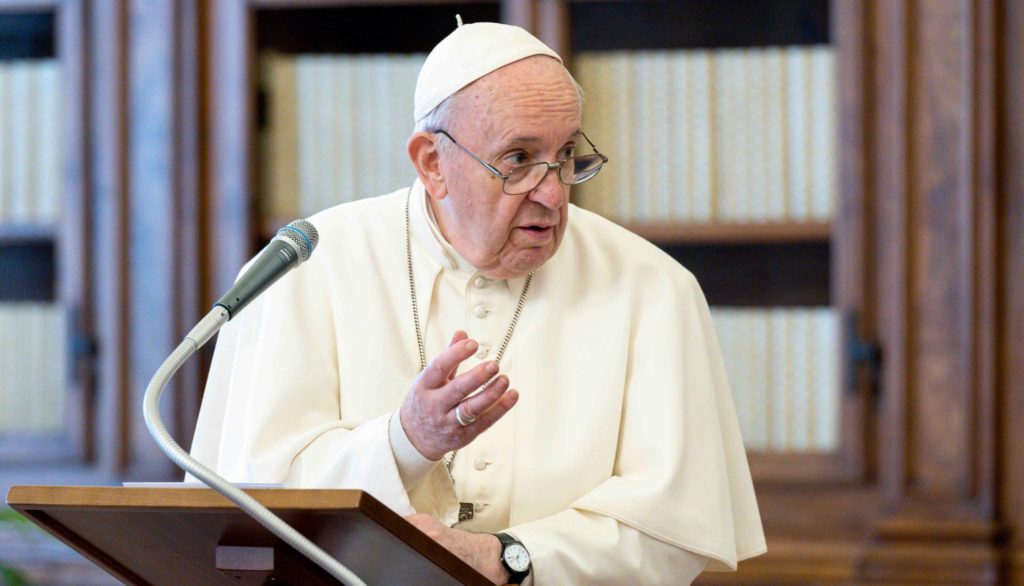On the first Wednesday of February, the Holy Father Francis held the general audience from the Library of the Apostolic Palace.as usual due to the health emergency.
The catechesis took place after the reading of the Letter to the Hebrews in different languages, which served as inspiration for the Pope's preaching. This text speaks of the elect, of those who have approached the heavenly assembly, a multitude of angels, an assembly of the first-born whose name is written in Heaven.
– Supernatural Arabic reading has attracted particular attention, with a close horizon of the Pope's apostolic trip to Iraq in early March.
Francis continued his catechesis on prayer. At today's general audience, he reflected on the relationship between prayer and liturgy. He began by recalling the traditional intimate prayer that had been consolidated in some periods of the Church's history. A religiosity that did not recognize the spiritual dimension and importance of the liturgy. This led many of the faithful, even when participating in Sunday Mass, to downplay its importance and to seek nourishment for their faith and spiritual life in devotional sources rather than in the liturgy.
Holy Mass cannot be merely "listened to", as if we were mere spectators of something that is happening without getting involved. Mass is celebratedand not only by the priest who presides over it, but also by the for all Christians who live it.
The roots of Christian spirituality
However, in recent decades, the Constitution on the Liturgy of Vatican II has underlined the importance of the divine liturgy in the life of Christians, for in it is found that objective mediation requested by the fact that Jesus Christ is not an idea or a feeling, but a living Person, and his Mystery, a historical event..
"The prayer of Christians passes through concrete mediations: Sacred Scripture, the Sacraments, the liturgical rites, the community. In the Christian life we do not dispense with the corporeal and material sphere, because in Jesus Christ it has become the way of salvation. We could even say that yes, now we have to pray with the body. The body enters into prayer.
A Christianity without liturgy is a Christianity without Christ.
The liturgy, the Pope explained, "is not just spontaneous prayer, but the action of the Church and an encounter with Christ himself."and, therefore, "there is no Christian spirituality that does not have the celebration of the divine mysteries as its source.".
"The liturgy is an event, an occurrence, a presence, an encounter. It is an encounter with Christ. Christ makes himself present in the Holy Spirit through the sacramental signs: from this derives for us Christians the need to participate in the divine mysteries. A Christianity without liturgy, I would dare to say, is perhaps a Christianity without Christ".
Even in the most stripped-down rite, - the Holy Father affirmed - such as that which some Christians have celebrated and celebrate in places of imprisonment, or in the hiding place of a house during times of persecution, Christ makes himself present and gives himself to his faithful.
Fervor is key to the celebration of the liturgy
The liturgy, moreover, asks to be celebrated "fervently"The grace poured out in the rite should not be dispersed, but should reach the life of each person.
Every time we celebrate a Baptism, or consecrate the bread and wine in the Eucharist, or anoint the body of a sick person with holy oil, Christ is here! It is He who does, it is He who is present. He is present as when he healed the weak limbs of a sick person, or gave at the Last Supper his testament for the salvation of the world.
The Mass is celebrated and lived
Thus, the Mass cannot be only "...".listened": "I am going to listen to Mass"is not an expression "correct"said Francis, because the Mass "is always celebrated":
"The Mass cannot be listened to without further ado, as if we were just spectators of something that glides by without involving us. The Mass is always celebrated, and not only by the priest who presides, but by all Christians who live it. The center is Christ! All of us, in the diversity of gifts and ministries, are united to his action, because it is He, Christ, the Protagonist of the liturgy".
In the liturgy we pray with Christ
Francis made reference to the fact that when the first Christians began to live their cult, they did "actualizing Jesus' gestures and words"The first step was to become a spiritual sacrifice offered to God, with the light and power of the Holy Spirit, so that his life, reached by that grace, would become a spiritual sacrifice offered to God. An approach that was a "revolution"For life is called to become a worship of God. Something that, however, "cannot happen without prayer, especially liturgical prayer.".
May this thought help us all when we go to Mass on Sunday: I am going to pray in community, I am going to pray with Christ who is present. When we go to the celebration of a baptism, for example, Christ is there, present, baptizing. "But, Father, this is an idea, a way of saying...": no, it is not a way of saying. Christ is present and in the liturgy you pray with Christ at your side.









